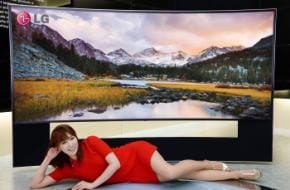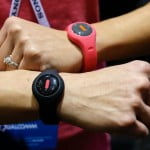
Most of the wearable products on display at the industry’s premier showcase looked like awkward attempts to shoehorn technology into new forms without an original or compelling benefit for the wearer, skeptics say.
Stacy Rasgon, a semiconductor analyst at Bernstein, spent a day at CES busily snapping photos of every fitness band, watch and other wearable device he came across.
“I have 20 different photos, but if I look at the pictures I couldn’t tell you which product is from which vendor. They all look the same,” Rasgon said. “Wearables sound like a great idea and there’s going to be a lot of experimentation. People are throwing spaghetti against the wall to see what sticks.”
Sony Corp, Samsung Electronics Co Ltd and Qualcomm Inc showed off new or recently launched smartwatches, most of which act as extensions to cellphones, letting users check messages and appointments. Wristbands – like the popular Fitbit that tracks physical activity – also accounted for a big chunk of the devices on display at CES.”For wearables to finally match up with the hype, (they have) to be a true solution, where it isn’t about the technology – it’s about what the technology enables you to do, something you couldn’t do before,” said Mike Bell, the senior executive leading Intel Corp’s wearables push.
“The function, form and experience have to be as important as the parts you slap inside,” he said.
Intel this week unveiled its take on wearables that Bell believes serve a clear purpose and could catch on, including prototype earbuds with a built-in heart rate monitor that changes the music on a smartphone to keep pace with a workout. It also announced a collaboration with luxury department store Barneys New York to develop smart bracelets intended to look like they were dreamed up by a fashion designer – not an engineer.
The wearables mania gripping the industry is in part a response to slowing smartphone and tablet markets. After growing 39 percent in 2013, global smartphone shipments are forecast to expand by just 18 percent annually through 2017, with prices steadily falling, according to market research firm IDC. Tablet shipments are seen up 22 percent this year, compared with 54 percent in 2013.
Tech executives say many consumers are intrigued by the potential for wearable gadgets, but they are also cautious. A survey by research company Yankee Group in December found less than 10 percent of respondents planned to pay $200 or more for a fitness wellness device.
A survey by Wakefield Research, commissioned by U.S. cloud-services company Citrix Systems , last November found 91 percent of respondents were excited about wearables, but 61 percent said they had no plans to purchase one.
Simon Randall, whose British-based OMG Life Plc makes a wearable camera called Autographer, is not surprised. He recalls the lukewarm reception when Nokia , his employer at the time, introduced camera-phones more than a decade ago.
“New things take time to be broadly adopted but if there’s an intrinsic benefit at the heart of them they’ll prosper,” Randall said.
HAUTE COUTURE
Samsung’s $300 Galaxy Gear may have had the biggest launch of any wearable so far – but it was panned by reviewers. It shipped an estimated 800,000 of the watches in the two months since it was introduced in September, a figure that pales in comparison to the millions its smartphones manage.
Some experts said Apple may have the best chance of developing a gadget that will propel the wearable category into prime time, given its track record in consumer devices.
“2014 will be more a year of attempts than of successful products. And for a lot of manufacturers it will be a matter of waiting to see what Apple does,” said Carolina Milanesi, a consumer tech analyst at Kantar Worldpanel.
While the electronics show lacked sure-fire winners, some offers were definitely intriguing and drew crowds.
Epson unveiled a $700 pair of eyeglasses that allow the user to simultaneously view data about objects they are looking at. Sony’s prototype glasses can display captions and information about programs a viewer is watching on TV.
Another offer was a bracelet made by Netatmo embedded with a sensor that looks like a jewel and which measures exposure to sunlight, helping the wearer decide when to put on sunscreen.
Even Qualcomm, one of the largest companies now touting the impending wearable device revolution and purveyor of the “Toq” smartwatch, acknowledges the hurdles ahead.
Raj Talluri, who oversees the design of its Snapdragon smartphone processors, wants to add the same chips to watches and apparel to let them handle much more sophisticated functions. But more work needs to be done on power consumption.
“The power consumption of processors really needs to get an order of magnitude less,” Talluri said. “People’s expectation in wearables is not that they have to charge them every day. They want to wear things for weeks.”
© Thomson Reuters 2014
Stay in touch with the latest from CES 2014, via our CES page.
CES 2014 – World’s biggest tech event in pics











